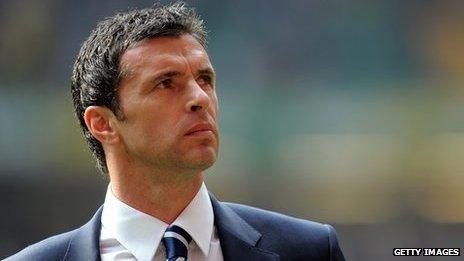Gary Speed - player and manager
- Published

Speed is Wales' second most capped outfield player
Gary Speed will be remembered as one of Welsh football's greats, serving as captain and more recently as national team manager.
Born in Mancot in Flintshire, Speed began his career as a schoolboy with Leeds United and made his first-team debut at 19.
Speed established himself there during a revival in the Elland Road side's fortunes under Howard Wilkinson.
He won a Second Division title medal in 1990 as Leeds secured a return to English football's top flight.
Speed's blossoming career at Leeds was quickly recognised by Wales.
Manager Terry Yorath handed him his first cap against Costa Rica in a friendly at Cardiff's Ninian Park in May 1990 - only a day after Speed had played for the under-21 side against Poland.
During the 1991-1992 season Speed played a key role in Leeds United's First Division title win and featured in a midfield alongside Gordon Strachan, Gary McAllister and David Batty.
Making over 300 appearances and scoring 57 goals for Leeds, he left the club during the summer of 1996.
A boyhood Everton fan who delivered newspapers to the home of former Toffees captain Kevin Ratcliffe, Speed moved to Goodison Park for £3.5m.
But his spell at Everton, where he was club captain, was a short one.
Everton were struggling in the Premier League and Speed moved to Newcastle United in February 1998 for £5.5m and within a few months he was part of the Newcastle side at Wembley for the FA Cup Final - only to lose to league champions Arsenal.
They returned to Wembley the following year, but Speed and Newcastle's FA Cup dreams were again dashed, this time by treble-chasing Manchester United.
On the international stage, Speed was by now a valued member of the Welsh side and played a pivotal role in their revival under Mark Hughes.
Hughes appointed Speed as his captain, and he skippered the side to a famous victory over Italy at a packed Millennium Stadium in a Euro 2004 qualifier in October 2002.
Wales reached the Euro 2004 play-offs but would ultimately lose to Russia , externaland Speed, like so many Welshmen before him, was denied the chance to appear in a major championship.
In October 2004, in Hughes' final game in charge against Poland, external, Speed decided to retire from international duty.
Speed left the Millennium Stadium pitch to a standing ovation - recognition of his 14-year international career.
He scored seven goals in 85 appearances, and remains Wales' most-capped outfield player and second only to Neville Southall as most-capped Welshman.
Having played in the Champions League and with over 200 Premier League appearances for Newcastle, he left the club for Bolton Wanderers in July 2004, external.
He was briefly player-coach at Bolton before he joined Sheffield United in January 2008, making his debut against Wolves on New Year's Day.
Speed had managed to avoid major injuries throughout his career but a back injury curtailed his playing days at Sheffield United.
He began to concentrate on coaching as part of Kevin Blackwell's team at Bramall Lane.
When Blackwell was sacked in August 2010, the Blades turned to Speed, who signed a three-year-contract.
Speed had often been seen as a potential national manager and was linked to the Wales job when John Toshack left in September 2010.
United allowed Speed to speak to the Football Association of Wales about the vacant role of team manager, and he was appointed in December 2010.
He took charge of Wales for the first time against the Republic of Ireland in Dublin in February 2011, external, a game which ended in a 3-0 defeat.
Wales would lose their following two games - against England and Scotland - before Speed enjoyed his first victory as manager - a 2-0 win over Northern Ireland.
Following a difficult start, Wales began to show promise during the end of 2011, and Speed's first competitive win came against Montenegro in a Euro 2012, external qualifier in Cardiff.
The national side lost narrowly 1-0 to England and Wembley before securing victories over Switzerland, external and Bulgaria, external to complete a disappointing qualifying campaign on a high.
Those results saw Wales rise 45 places to 45th in Fifa's rankings, external and their international year ended with a 4-1 friendly win over Norway.
With the emergence of Aaron Ramsey and Gareth Bale, Wales' future began to look bright under Speed's leadership, following years of underachievement.
Speed was planning for the start of 2014 World Cup qualifying campaign and attended a fixtures meeting in Brussels last week, external.
Football fans will share in the loss of a man who, having achieved so much as a player, was on the verge of more promise yet for his nation.
- Published27 November 2011
- Published27 November 2011
- Attribution
- Published27 November 2011